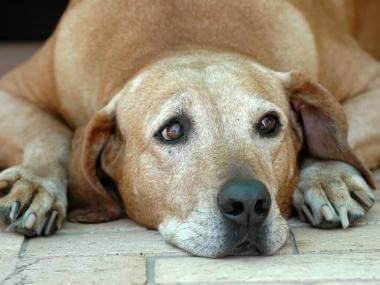How to Make Your Senior Dog’s Twilight Years Comfortable
Just like humans (or any living being), dogs require extra care as they get older. Understand how your pet’s needs change with age so you can make the best possible life for your canine best friend.
Today, we’ll introduce the most common issues pet parents encounter as their dogs start aging and talk about the most important things to pay attention to in order to make your canine companion’s last years as comfortable as possible.
When is a dog considered a senior?
When exactly does a dog get into the “senior” category? It depends. Larger breeds generally age faster than smaller breeds, so they have a lower life expectancy.
According to the Canine Life Stage Guidelines created by the American Animal Hospital Association (AAHA), the last quarter of a dog’s life (according to average life expectancy for the breed) is considered the senior age. So, Chihuahuas, who usually live 14-16 years would be considered seniors from age 12, while a Great Dane would be considered a senior at around 5 or 6 years of age.
Of course, predicted life expectancy and how you care for your senior pet depends on the individual dog—his exact age is not as important as paying extra attention to signs of aging.
What to expect as your dog ages
Once a dog starts to approach the senior years of his or her life, it is normal to notice certain changes in temperament and behavior. An elderly dog might play less, be less responsive, and generally prefer to spend most of the day sleeping.
While these behavioral changes are completely normal, there are also many diseases that are associated with old age in dogs. Arthritis and degenerative joint disease, heart issues, dental issues, obesity—these are just some of the health challenges your senior pooch might face. So what exactly can you do? Here are some simple tips to make your dog’s twilight years as comfortable as possible.
How to care for senior dogs
Regular vet visits
While regular visits with the vet are always a good idea, they become even more important with aging dogs. As many diseases and health issues are more likely to appear in older age, it is important to get your dog checked up at least once a year, even if it seems everything is all right. The AAHA Guideline recommends going to the vet even more often—twice a year is optimal for a healthy senior dog.
Diet adjustments for senior dogs
A dog’s diet definitely becomes more important as the dog ages. While a young, healthy dog can eat almost anything, older dogs often need their diet adjusted to various health conditions they might be living with.
Issues with the digestive and urinary tract are quite common in older dogs of all breeds. In these cases, it’s important to work with your vet to find easily digestible food that will benefit your pooch the most. Research suggests that food low in phosphorus and with medium protein content is best for senior dogs.
Deciding on the right food option for your senior dog can be daunting. Look for dog food guides like this one that break down nutrition considerations, age and size factors, and special diet formulas that are specifically suited to your dog.
In addition, you might want to consider adding supplements to your dog’s food to help deal with any health issues or discomfort (always in consultation with the vet, of course). Fish oil and other supplements rich in Omega-3 fatty acids can be of great help for dogs suffering from arthritis. Ginkgo leaf extract is another researched-backed supplement that can benefit older dogs.
Exercise for older dogs
Older dogs often don’t have as much energy as they had in their younger years, but this does not mean they should be lying around all the time. If you want to give the best care to your senior dog, make sure to provide opportunities for physical activity that are tailored to your aging dog’s needs. A short walk a couple of times a day might just do the trick, but always pay attention to see if your dog is tired.
There are also plenty of ways to keep your dog entertained without too much strenuous activity. Various toys and food puzzles are always a good idea as they provide entertainment for your pooch. But the most important thing is to spend time with your canine friend!
Dental care for elderly dogs
We might not often think about it, but dogs are very prone to teeth problems. As they age, dental issues can get more common. Small and tiny breeds—and especially brachycephalic (broad-headed, short-faced) breeds—are the ones who are most likely to experience dental problems in older age.
Providing dental treats, or even brushing your dog’s teeth if they are really sensitive, will help prevent dental issues. However, if the problems are already there, the best you can do is talk to a vet about appropriate therapy, and make sure to provide food for your dog that is soft enough to chew.
This article was reviewed and endorsed by Dr. Kath Dench, a Qualified Veterinary Surgeon with over 10 years of practical experience.





